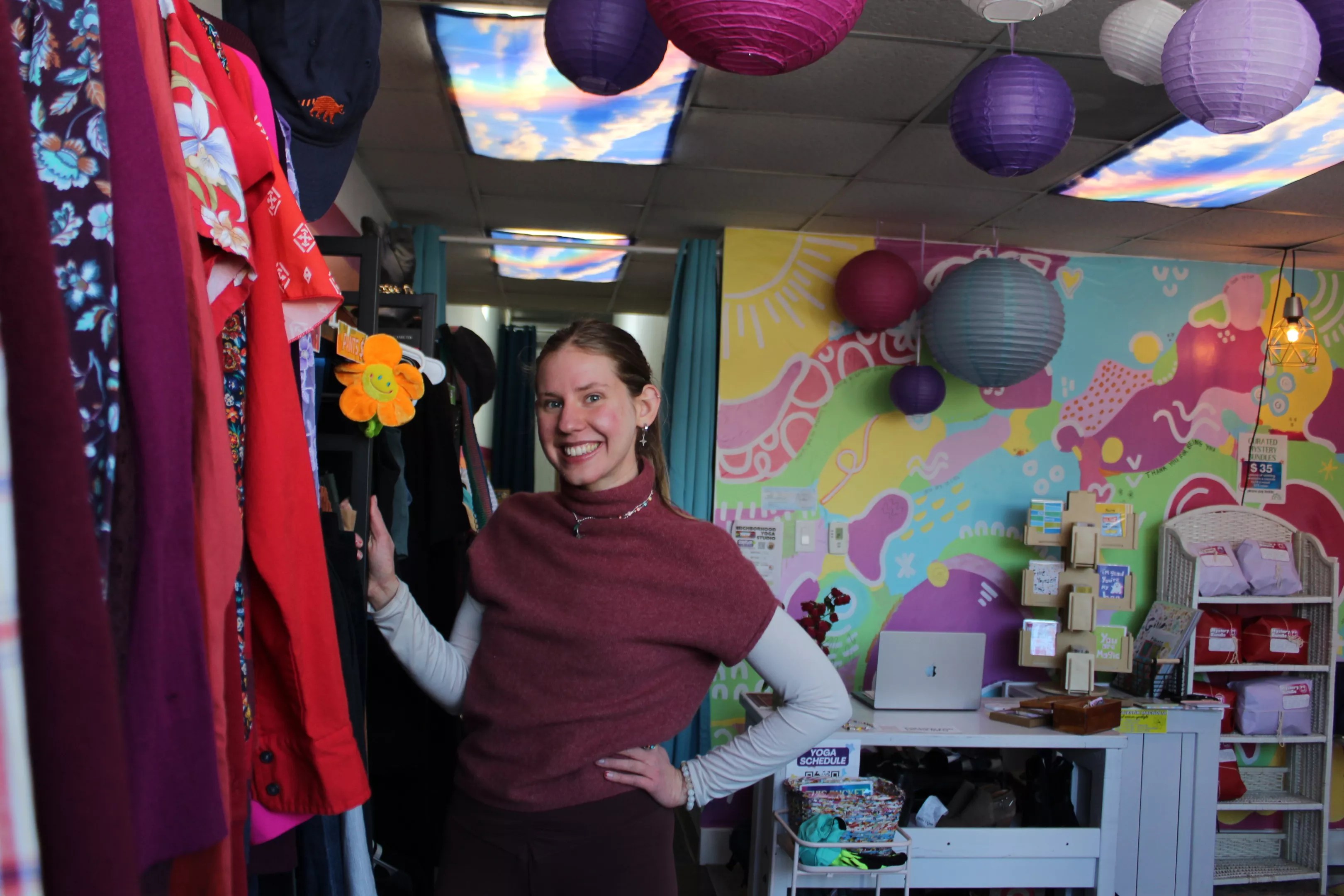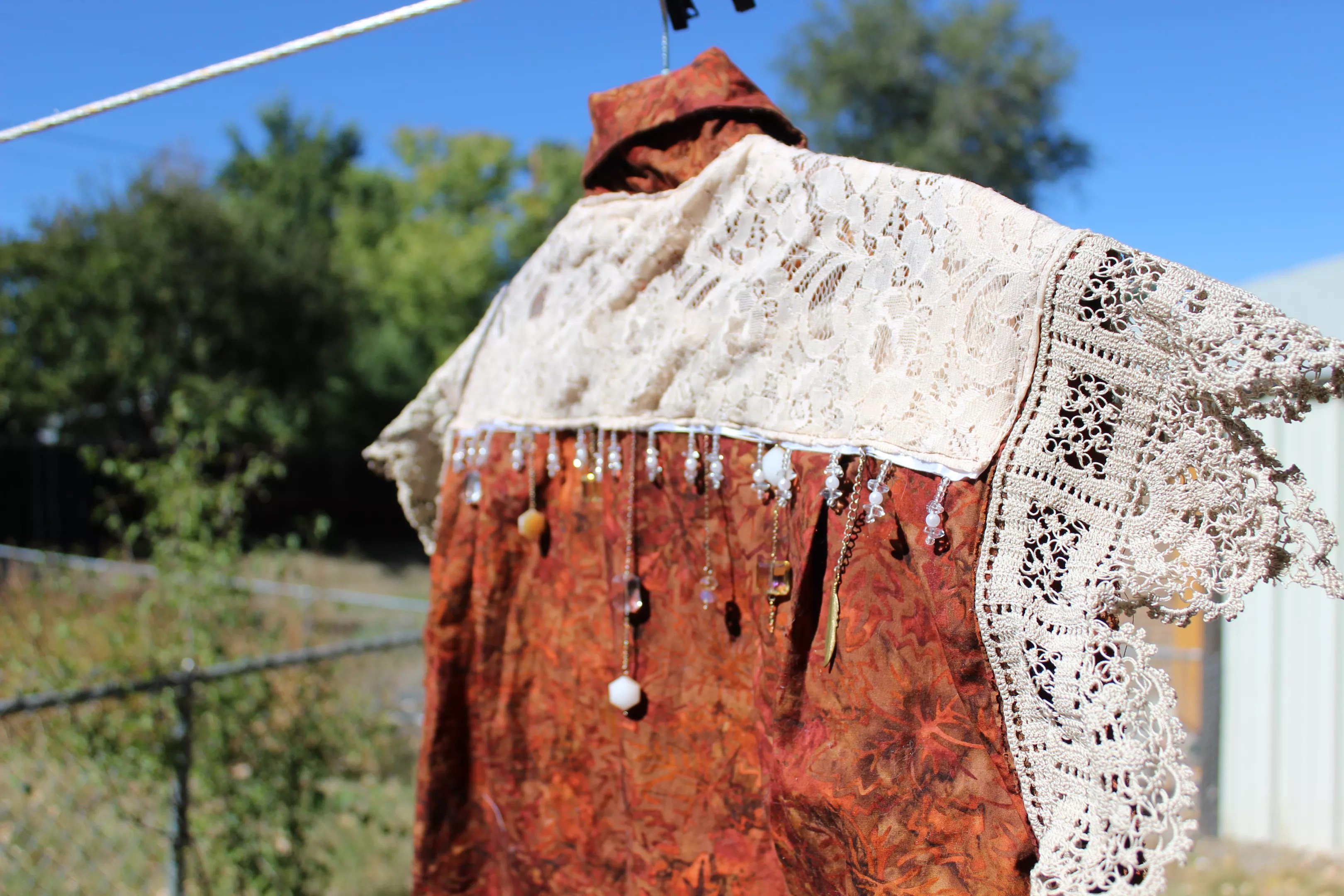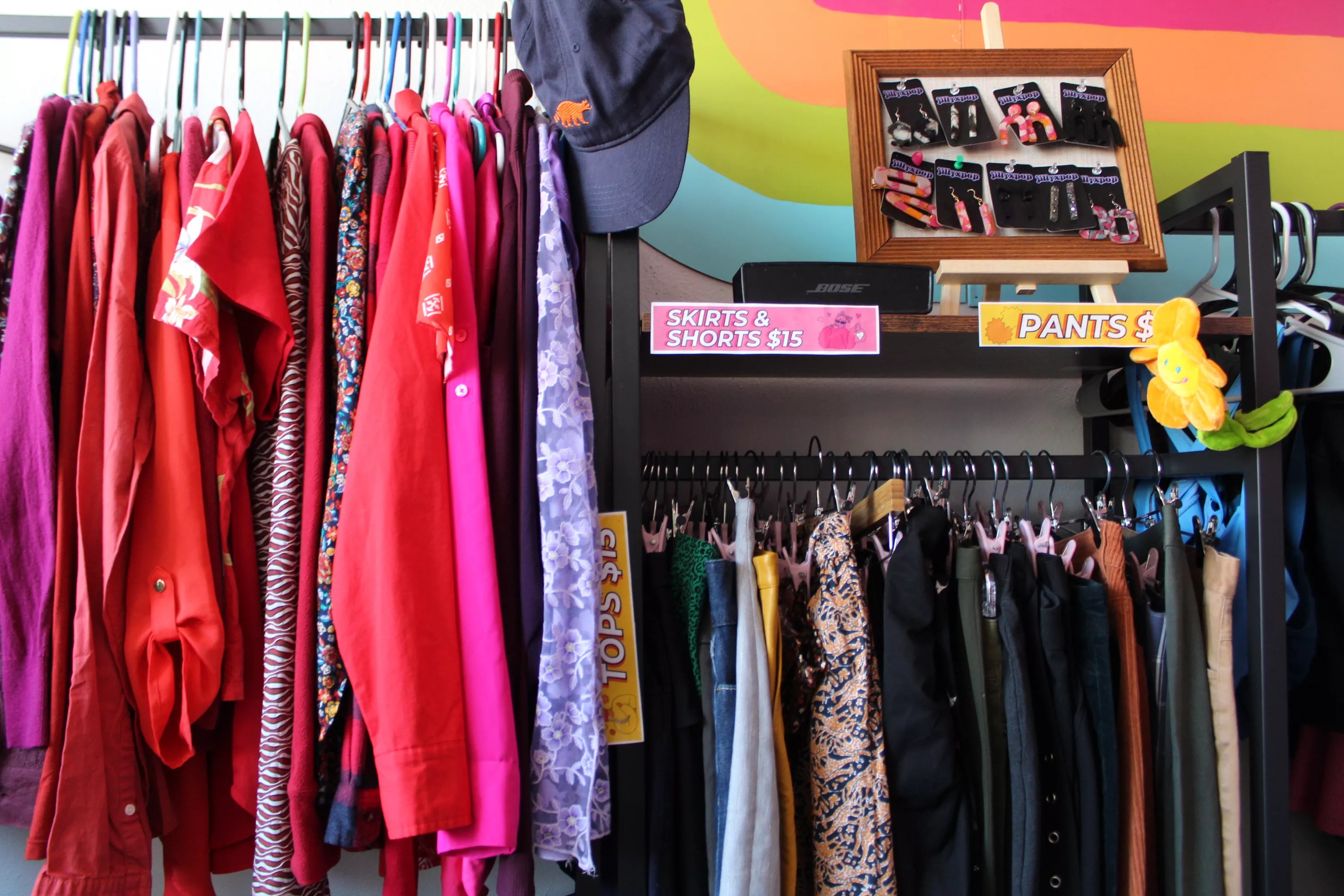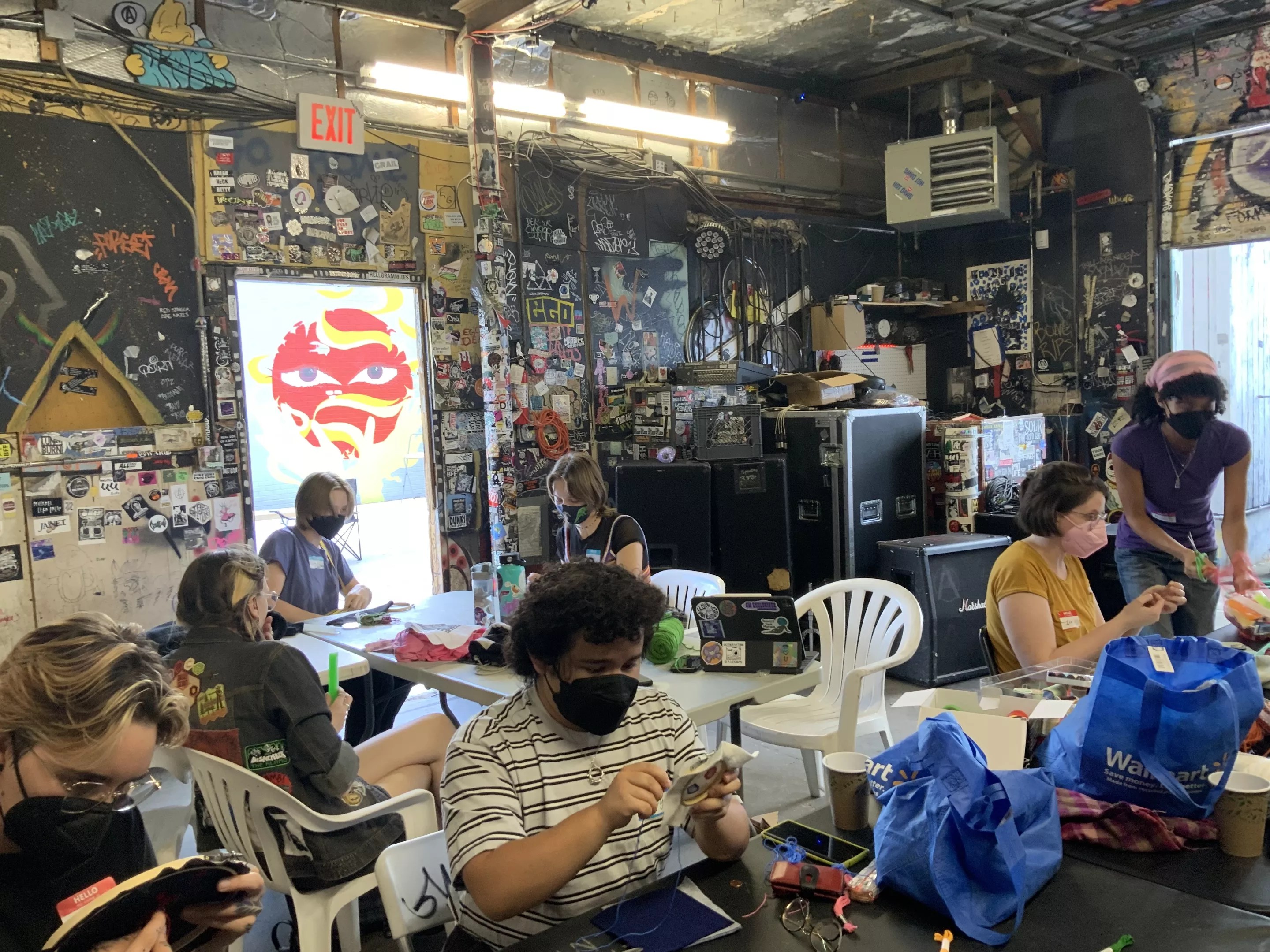
Heather M. Smith

Audio By Carbonatix
Aliyah Wallace has things to say, and chances are she’s going to put those things on a shirt. The Littleton-based fashion designer cuts the letters out of old T-shirts and uses them to spell out phrases like “Trans Rights,” “Dyke Power” and even “Bella, Where the Hell Have You Been, Loca?” (a Twilight reference, for those who are uncultured).
Wallace’s AW Exclusives is one of many small businesses, events and communities popping up in the growing realm of clothing upcycling and sustainable fashion. And sustainable fashion is in style in environmentally-conscious Denver, where people are becoming more aware of the waste created by fast fashion – cheap clothing made in sweatshops with new designs being released every day, encouraging people to discard their clothes and buy new garments online (think brands like Shein, Zara and Brandy Melville).

Aliyah Wallace has things to say, and chances are she’s going to put those things on a shirt.
Billie Warnock, @heavylight___
Every year, people in the United States throw out billions of pounds of used textiles. Most clothing that is donated to thrift stores ends up in landfills around the world, contributing to mountains of textile waste in third-world countries, according to sources like ABC News and Boston University. In Denver, artists and fashion enthusiasts are finding local solutions to this problem by keeping clothes circulating in the community through clothing swaps and by upcycling their own clothes (and teaching others how), so that old garments can become something new and unique to the wearer instead of being thrown away.
When Wallace was sixteen, she got a job and her parents stopped buying her clothes. She started thrifting and upcycling her clothes to keep up with the trends; eventually, it turned into an exploration of her own personal style. “You can find individual pieces so you’re not wearing the same thing everyone else is wearing, which really stuck out to me – just trying to be a little bit different in the fashion scene and not necessarily go with the trends, even though that’s why I started. It helped me become an individual in my style but also while not creating more waste,” she says.
After reading about the textile waste crisis, Capitol Hill resident Katessia Robertson was inspired to make a change. In a report by the Eileen Fisher Foundation, she’d learned about a direct local intervention: clothing swaps, in which people bring old pieces they don’t wear anymore but are still in good condition to a community space, and then everyone swaps their clothes, picking out garments that they would wear and trading them for the clothes they no longer use. In response, Robertson started the Clothing Cycle, which she describes as a “closed loop fashion system that centers community and climate.” The Clothing Cycle organizes clothing swaps and works with upcycle designers to keep clothes circulating in the community instead of being sent to landfills.

Brea Kennedy stands in her secondhand clothing shop and community space, Solstice: Style & Stretch in Denver.
Kristen Fiore
Similarly, Brea Kennedy was looking for a local solution to the fashion industry’s waste problem when she started hosting clothing swaps in her living room. That turned into her own secondhand clothing shop and community space – Solstice: Style & Stretch in Denver – as well as participating in massive clothing swaps. “The most recent one was at Stanley Marketplace and we had like 200 people,” Kennedy says. “In those swaps, we go through 5,000 pieces of clothing in three hours.”
On the upcycling side, artist Bucky Grant started teaching monthly visible mending meet-ups called Stitch ‘n’ Bitch at Seventh Circle Music Collective. The events, which are put on through Wallace’s art club, Artists In Sync, teach people how to mend and upcycle their clothes so that they can keep them for longer. “I set up with scrap cloth, thread, buttons and other notions – needles, scissors, embroidery supplies – and invite people to bring clothes they want to mend to the workshop,” Grant says. At the events, Grant takes a look at common mends like worn-down pockets or clothes that need to be hemmed or tailored and suggests fixes.
“This is a skill that I love that I have and I love to be able to improve on, and pairing that with being in the punk music scene here in Denver and being part of a scene that was built upon working class and poor people maintaining their clothing and embellishing it in unique ways with very low budgets: making spikes out of cut up soda cans or dying a ball gown you found at the thrift store black,” Grant says. “That kind of ‘DIY or die’ attitude combined with the fact that I can sew, combined with the fact that I’d like to spend less money on clothes, coalesced into this desire to mend my own clothing.”
As a transgender person, getting to make alternative men’s fashion is one of Grant’s favorite parts about being a clothing upcycler. Grant uses recycled handmade lacework as the fringe on a cowboy shirt, string beads beneath collars, sews on their own hand-printed patches and cuts clothes into more flattering shapes for transmasculine and transfeminine people. “Everyone deserves fashion and clothes that flatter them, and getting to take a step back from printed patterns and designing my own things and things that are for people like me is another way of increasing the connection between people and their clothing,” Grant says. “And if you love your clothing and love the way it fits, you’re more likely to keep it and want to maintain it.”

One of Bucky Grant’s upcycled shirts.
Bucky Grant
Many of Wallace’s creations also center on a celebration of being queer, and moving to Denver opened that world up for her. She was making queer pieces when she first started upcycling in Indiana, but it was very toned down. “As soon as I moved here, I hopped straight into the queer culture in Denver, and it was more accepting and very out there,” she recalls. “So I was like, ‘Oh, I don’t really have any limits. I can make shirts that say crazy things.’ I got to be more experimental. My progress from Indiana to here has been insane, and every week I think of more crazy queer sayings to put on shirts.”
The response to her clothing designs has been amazing, Wallace adds, and she’s had many repeat customers specifically seeking out her pieces. “They’ll get sets, pants or shirts that match,” she says. “I have one person who’s a teacher, and she has seven of my ties that I created, and she’ll do outfits with all the ties throughout the week. It’s been incredible.”
Since it started in 2023, the Clothing Cycle has seen a lot of support, too, as well as people interested in learning more, Robertson says, adding that people are always surprised that they can swap clothes for free or pay what they can if they don’t bring clothes to trade.
Meanwhile, Kennedy stocks her store with donated clothes and pieces left over from clothing swaps, and pretty much every item is priced at $15 to equalize the value of the clothes. She does not turn away (or throw away) donations, saving clothes that need extra TLC to give to local upcyclers and art workshops, like a recent vagina-art event that used damaged fabric scraps, lace and beads.
Her space is meant to foster connection, especially between women. “I feel like the disconnect between women mirrors the disconnect we have with nature, and that’s at the root of pretty much all of our societal issues – feeling apart from one another, apart from nature,” she says.

Kennedy stocks her store with donated clothes and pieces left over from clothing swaps, and pretty much every item is priced at to equalize the value of the clothes.
Kristen Fiore
Events like the Clothing Cycle’s pop-up swaps and Grant’s Stitch ‘n’ Bitch also help foster connection. “You’re able to see where the clothes came from,” Robertson says. “It’s really cool for someone to get something off a rack and then someone else to be like, ‘Oh, that was mine. I’m so happy that it has a new home.'”
At Stitch ‘n’ Bitch events, Grant says, everyone ends up helping each other: “I’ll teach someone something, go help someone else, and then the person I just taught is teaching someone else that same stitch or skill. And I’m like, ‘Yes, build the community power! More mending.'”
The events not only strengthen connection between people but bridge the disconnect between people and their clothes. “It’s quite surprising how little I find that people know about the fashion industry and the harms of the fashion industry,” Robertson says. “People don’t take the time to think about where the items they consume come from, and all the work and resources that go into that as well. I’m really grateful for the opportunity to teach people.”

A Stitch ‘n’ Bitch gathering at Seventh Circle Music Collective.
Bucky Grant
There is not a single piece of clothing that was not made at least in part by human hands, Grant adds: “Humans have to actually operate the sewing machine, they have to cut the fabric pieces, hand-sew on embellishments. There are knitting machines, but crochet cannot be replicated by a machine, it’s always handmade. …Teaching people how their clothes are made and how to maintain them reduces that alienation of labor, reduces the disconnect between the people who are making the clothes you wear and the people who are wearing the clothes.”
After all, humans have been making clothes for thousands of years, and we’re only about two generations removed from homemade clothing. “There’s also a saying that it takes two generations to make a tradition, that it only takes telling your children and then your children telling their children a story to create a tradition or culture,” Grant says. “I think it’s important to look at the ways we’ve been maintaining our clothing up until plastic and fast fashion overtook the industry, and enjoy the act of spending time with clothes you want to keep instead of discarding them as soon as they’re not perfect. We need to care about keeping what we already have and that the most sustainable things are the things we already have.”
Grant jokes that they felt their soul ascend through the heavens and loop around into hell when they heard about people who intentionally don’t repeat outfits.
“It’s okay to wear your clothes more than once,” Grant advises. “If you like something, then it’s good if you wear it until it needs to be mended. To be loved is to be changed, and if you love your clothing, then it’s okay to change it. Your body will change. It’s okay to change your clothes with it.”
Environmental issues are big and overwhelming, but individuals and communities do have power in the choices they make.
“Learning how clothing is constructed, learning how to fix clothing, even if you don’t necessarily repair it yourself, puts a lot of power back into your hands to not be taken advantage of by fast-fashion companies that want you to buy new clothes every month,” Grant concludes. “Everyone has the power to care about what their clothes look like and make things that are unique to themselves. Even just being aware of how and why you might want to mend an article of clothing is going to change the way you look at your clothing, and it’s going to give you a deeper connection with your wardrobe and your fashion and make you feel more empowered and a lot more stylish and content in your own form.”

Aliyah Wallace in her workspace.
Heather M. Smith
Interested in upcycling?
The most sustainable thing is what you already have. For people wanting to be more sustainable with their fashion or get into upcycling, Grant advises taking a look at your wardrobe. If you have something you’ve been holding onto because you love it but don’t wear it anymore, don’t be afraid to make it into something new, or cut it up and attach it to something else. Attend a visible mending workshop or watch YouTube videos to learn how.
The ideaLAB in the Denver Central Library has a sewing machine that is free to use. ReCreative, a used art supply store in the Art District on Santa Fe, sells affordable sewing supplies and materials and offers workshops.
“You can even trace clothing you already have and make patterns and duplicate the same sweatshirt, if you have a sweatshirt that you really like,” Grant says. “The intentionality in caring about what you wear and caring about what looks good on you and the willingness to get your hands a little dirty and cut things up is a big way to approach sustainability.”
If you’re afraid to try it yourself, commission a clothing upcycler. “If you have a piece that you like but aren’t wearing it much, there are always people who can add things onto it,” Wallace says. “You can put something on a piece that changes the vibe.”
Still want new clothes? Buy secondhand or go to a clothing swap. If you need an outfit for a particular occasion, you don’t necessarily have to go out and buy a new one. You might be able to borrow one from a friend, Kennedy recommends. She also advises taking care of the clothes you already have: wash clothes inside out and with cold water.
Find Aliyah Wallace’s clothes at Sinner’s Hair + Nails (1872 South Broadway), Roostercat Coffee House (1045 Lincoln Street), Fairy Hair Forever (1111 Broadway) and on her Instagram, @awexclusives. Learn more about Bucky Grant’s art and Stitch ‘n Bitch events at suprsaturatd.com, more about the Clothing Cycle at linkpop.com/theclothingcycle, more about Solstice: Style & Stretch on Instagram @solsticestylestretch, and more about Artists In Sync at linktr.ee/Artistsinsync.